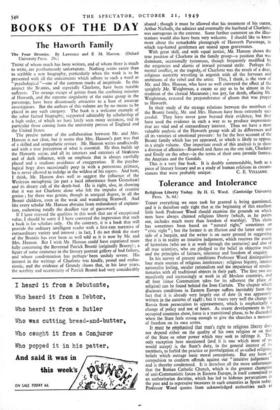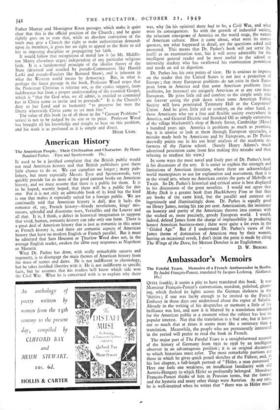Tolerance and Intolerance
TODAY everything we once took for granted is being questioned, and it is therefore only right that at the beginning of this excellent little book Professor Wood should examine the grounds on which men have always claimed religious liberty (which, as he points out, includes much more than freedom of worship). This claim has sometimes been based on "natural right," sometimes on "civic right " ; but the former is an illusion and the latter only one side of a bargain, and the writer is on surer ground in suggesting that it is in reality an intuitive judgement, which receives the assent of historians (who see it at work through the centuries) and also of all true scientists, who are pledged to the belief in objective truth and the principles of fairness, tolerance and freedom of enquiry.
In his survey of present conditions Professor Wood distinguishes four main sources of religious intolerance : religious bigotry, intense nationalist feeling, secular rationalism and the impatience of revolu- tionaries with all traditional objects in their path. The first two arc manifestly and increasingly at work in all Moslem countries, and all four (since Communism takes for its adherent the place of religion) can be found behind the Iron Curtain. The chapter which discusses conditions in Eastern Europe suffers inevitably from the fact that it is already very largely out of date (it was apparently written in the autumn of 1948); but it traces very well the change in Russia from persecution to appeasement, which is emphatically a change of policy and not of heart. As recent developments in the occupied countries show, force is a transitional phase, to be discarded when the State feels strong enough to give the churches a measure of freedom on its own terms.
It must be emphasised that man's right to religious liberty don not depend either on the quality of his own religion or on that of the State or other power which may seek to infringe it. The only exception here mentioned (and it is one which most of us would accept) is the State's duty, in the general interest of its members to forbid the practice or promulgation of so-called religious beliefs Which outrage basic moral conceptions. But any form of compulsion to conform offends against our "intuitive judgement" and is thereby condemned. It is therefore all the more unfortunate that the Roman Catholic Church, which is the greatest champion of anti-Communistic forces in Eastern Europe, is itself committed to an authoritarian doctrine, which has led to hideous persecutions in the past and to repressive measures in such countries as Spain today. Professor Wood quotes from acknowledged authorities such as
Father Murray and Monsignor Knox passages which make it quite clear that this is the official position of the Church ; and he quite rightly goes on to state that, while an absolute conviction of the truth may give a Church the right to make authoritarian demands upon its members, it gives her no right to appeal to the State to aid her in imposing discipline or propagating her faith. It would follow that recognition of moral law is (as Mr. Middle- ton Murry elsewhere urges) independent of any particular religious faith. It is a fundamental principle of the idealist theory of the State (deserted and assailed by pseudo-Communists like Harold Laski and pseudo-Fascists like Bernard Shaw), and is inherent in what the Western world means by democracy. But, in what is perhaps the finest passage in the book, Professor Wood urges that the Protestant Christian is tolerant not, as the cynics suggest, from indifference but from a proper understanding of the essential Gospel, which is "that the God who, we all admit, is entitled to command has in Christ come to invite and to persuade." It is the Church's duty to her Lord and to humanity "to preserve for men the liberty wherewith Christ came to set men free." The value of this book (as of all those in the "Current Problems" series) is not to be judged by its size or its price. Professor Wood has brought all his knowledge and insight to bear on this problem, and his work is as profound as it is simple and direct. HUGH LYON. HUGH LYON.



































 Previous page
Previous page